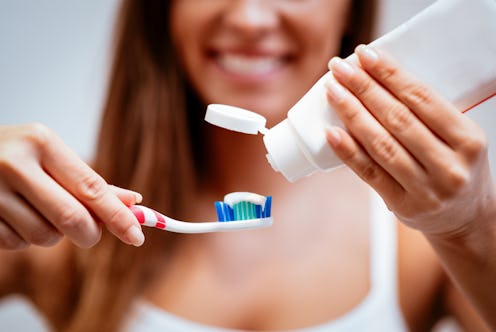Life
Here’s How Often You Should REALLY Be Brushing Your Teeth
As an anxiety-riddled child, I was convinced that if I missed the opportunity to brush my teeth even once, I would wake up in the morning with a mouth full of rotted nubs where my teeth used to be. Fortunately for my peace of mind, dental hygiene isn't that fragile — but how often should you actually brush your teeth each day? While scrubbing away with a toothbrush is arguably one of the easiest ways to keep your teeth in tip-top shape, a recent survey found that nearly one-third of millennials brush their teeth just once a day... which is less than you're supposed to. If you can count yourself among their ranks, I have a question: Do you kiss your mother with that mouth?
The survey was commissioned by Hello Products, a "naturally friendly" oral care startup. After looking at the dental care habits of 2,000 Americans, it found that three in 10 millennials regularly brush their teeth once a day, which is less than the nationally recommended twice a day. A full 22 percent of millennials avoid going to the dentist, too, because they hate the taste of the products dentists use. Overall, six in 10 people said they were downright afraid of dental appointments, preferring unpleasant tasks like public speaking or getting checked out by a neurologist to the idea of seeing a dentist.
Oh, and the research also reported that the average millennial had gone more than two days in a row without brushing at all. To each their own and all that jazz, but I wouldn't want to make small talk in an elevator with anyone who hadn't brushed their teeth in the last 48 hours.
Ironically, brushing your teeth is one of the best ways to avoid needing to visit the dentist for scary (read: painful) procedures like root canals or gum surgeries. According to the National Institute of Dental and Craniofacial Research, brushing your teeth with flouride toothpaste is one of the best ways to prevent tooth decay. Over the course of the day, plaque builds up on your teeth, and if it's left alone too long, it can lead to decay and gum disease. Brushing and flossing your teeth regularly keeps plaque (not to mention bits of food) from sticking around long enough to cause problems.
But what constitutes "regular" brushing? According to Healthfinder, a resource from the U.S. Department of Health and Human Services, the answer is twice a day. But a cursory scrub isn't enough to truly keep your mouth healthy. According to the American Dental Association (ADA), the proper brushing technique involves holding your brush at a 45-degree angle to your gums and "gently" moving it back and forth in short strokes. "Brush the outer surfaces, the inner surfaces, and the chewing surfaces of the teeth," the organization instructs.
The ADA also recommends flossing at least once a day and changing out your toothbrush every three to four months. Finally, even if the dental chair is a terrifying prospect, regular dental checkups are important in keeping your mouth healthy.
Unfortunately, dental care is one of the most expensive fields in medicine; in 2015, the Associated Press reported that its cost has "surged in the last two decades and continues to increase at a rate of five percent annually." According to Nerd Wallet, for example, the average out-of-pocket price of a root canal for a single front tooth is $762. For many Americans, that's prohibitively expensive.
The good news is that brushing your teeth is the cheapest way to take care of your teeth, and you don't even need to visit the dentist. All you need is a toothbrush, some fluoride toothpaste, and a sink. For a clean, healthy mouth, taking two minutes twice a day to brush your teeth isn't a bad trade-off.
